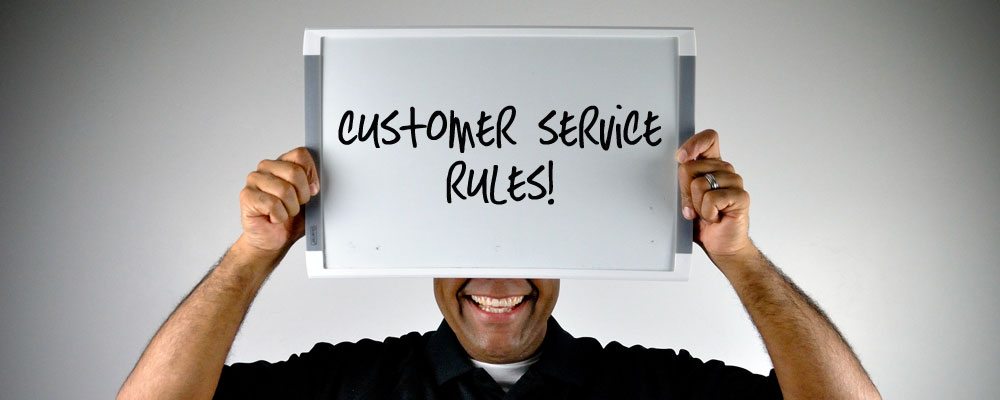Customer service can create a unique point of differentiation for companies. Marketing experts tell us that the customer’s satisfaction is of the utmost importance to successful companies.
Television and print advertisements bombard us with their promises to make us happy as buyers. And yet, according to a survey published in Time magazine, more than one-half of us are unhappy with the service and attention we receive from those who sell to us.
A Fortune 500 company may lose several thousand customers each quarter and never even know it. But if the typical small business owner loses even five customers per year she can find herself in big trouble quickly.
An effective customer service strategy, well executed, provides the most treasured asset for a small business — repeat customers.
For those of us struggling to stay afloat it is not a question of whether we will offer customer service, but how much. It is not an optional part of our marketing plan.
Every business makes mistakes from time to time, as do most human beings. Realizing that they sometimes make mistakes themselves, our customers usually understand when we make a mistake in serving them, if we handle it correctly.
A government-funded study done during the Carter Administration still holds great value for business owners regarding the results of good and poor response to customer service. The study revealed among other findings that :
- The average business never hears from 96%of its unhappy customers.
- Of customers who register a complaint, between 54% and 70%will do business again with the company if their complaint is resolved.
- The average customer with a complaint tells 9 or 10 people about it.
- Customers whose complaints were well take care of told five or more people about the treatment they received.
- Too many businesses, some small and a lot large, forget the strategy of profit maximization through repeat sales.
It is not uncommon to find a business without the proper customer service attitude arguing over a $5.00 mistake with a customer who generates $300.00 per year in sales. How ridiculous!
Even if you absolutely know that the customer is manipulating you, make every attempt to satisfy their complaint, because if you don’t they can eliminate a dozen prospects by bad-mouthing you. You can always choose not to do business again with chronically-complaining customers, once you do your best.
The goal of effective customer service is really very simple to state: making your customers as excited about your product or service as you are.
In fact, really gang-buster customer service often results in customers who become your best salespeople — and you don’t have to pay them a commission!
Let’s look at how to put together a winning customer service plan.
Good Customer Service Starts at the Top
Many of you are just starting out and do not have employees. But someday you may and now is a good time to start practicing “top-down” customer satisfaction.
Ask yourself. “Even when I am under time pressure, do I take the time to really listen to the customer’s need or complaint? Am I prepared to offer a satisfactory response? And do I follow up quickly?”
If you are not confident that you can provide the level of service consistent with this type of response, you need to rethink your customer service strategy.
It is relatively easy to be accommodating when you first start your business and do not have many customers calling. But if your marketing is working, the phone traffic will increase quickly and can catch you by surprise.
It is very useful to spend time before you launch laying out the following “mini-plans” as part of a comprehensive customer service strategy:
Your quality plan.
Can you define, based on customer need, costs and competition, the exact features of your product or service that will define quality for your customer? How about breadth of assortment? Customization available? Ease of buying? Durability and ease of use?
Your communications plan.
How will prospects be able to tell you they want more information? How will you assure they get it quickly? How can customers place orders? Is a live answering service critical? Or will voice-mail suffice? Do you need a pager or portable fax machine?
Your supplier plan.
Once you have set your level of quality, can you find the appropriate suppliers of products, materials and service to assure this quality level? Will you be fully informed about all of their services, so that you can ten a customer while they are on the phone whether you can do what they want?
Your personnel plan.
Can you really handle sales prospecting, sales support and customer service all by yourself? Does your business require written bids or proposals? Are you able to turn them out professionally, but quickly? How much travel will you have to do? Who will fill in while you are out?
Your product development plan.
Can you organize a system for creating new products and services on an orderly basis? Which outside advisers would facilitate the process?
How will you evaluate the potential costs and sales return?
The ideal approach is put into writing these mini-plans, as well as your customer service philosophy and the operational details.
You may not feel you need to see it in writing, but what about the first part-time employee or even a temporary worker?
How can you assure a consistent level of quality whether you answer the phone or someone else does?
“Do as I say, not as I do” may work with some young children, but it rarely works with adults, particularly employees.
You have to personally be true to your customer service plan every day and make it obvious to those who work with you that they must satisfy your customers. This includes employees, suppliers, even your delivery company.
Remember, your business is an attempt to make your dream come true. Others often have to be convinced to have the same level of conviction.
Showing People You Really Care
You would be amazed at how little it takes sometimes to make someone feel really well taken care of.
Most people are reasonable in their demands — they want you to show you really care in exchange for their hard-earned money.
Just saying “thank-you” produces a lot of smiles.
Develop your own thank-you system. Some use attractive thank-you notes. Others call every new customer after their first order to check their satisfaction and to tell them they appreciate their business. Smart marketers send customers surveys out from time to time and promise a small gift for returning them.
Many successful small business marketers provide information and education on how to better use their products and services.
We have produced a series of short reports on key business start-up topics that can be ordered for a minimal cost. We gave many free information seminars when we were starting.
Some companies sponsor contests among their customers — to pick a product name, guess a name or number or come up with the most unusual use for their product. The winners are prominently communicated by the company to all of their other customers.
Probably the most sincere form of caring about your customers is to keep your promises.
It is very easy when you are new in business to over promise. You desperately wish to please everyone. You may take on too many jobs at one time (believe it or not it does happen). Or you may accept work that requires skills you do not currently possess.
It is better for your ongoing relationship with the customer to ask if the job schedule can be extended or to honestly tell them that the skill required is not a strong point for you.
Over time you will meet other entrepreneurs in businesses similar to yours.
You can avoid telling a customer “no” outright by trading work with them on a subcontracting basis. As long as the finished quality is what you promised the customer, they do not necessarily need to know that someone else helped you.
Remember that your customers are an excellent source of new product and service suggestions. Their needs change over time and if they feel you care, they will tell about their new wants. AR most people want is good value for their money and some sense that they purchase is appreciated.
Key Questions to Ask
Customer service is one area where small business can effectively compete against larger companies.
But you must be prepared to provide comprehensive satisfaction, because many customers expect better service from a small company than from a large corporation.
To create a successful customer service strategy, you should think carefully about the answers to the following questions. Give yourself plenty of time to improve in the areas you are currently weak, before you officially open for business.
1. How easy is it for your customers to reach you personally? How can you make it easier?
2. Do your customers have to talk to more than one person to receive service? How can you cut the red tape?
3. Are your pricing policies clearly explained?
4. Are your credit, return and special order policies designed to benefit your Customers? Or your accounting system?
5. Can you honestly say that your product or service delivers the benefits your advertising claims?
6. Do you make it easy for your customers to order? To pay?
7. Do you give your customers an easy way to make complaints?
8. Have you trained everyone who will deal with customers in the basic feature-benefit story of all of your products or services?
9. Is your business listed in the local white pages of the telephone directory? The Yellow Pages?
10. Have you examined a toll-free 800-phone number for placing orders?
11. Does your company name, address and phone number appear prominently on all of your sales literature?
12. If in retail, do you provide directions on how to reach you?
13. For retail, is there ample parking near your store?
14. Do you inform customers of delays in delivery?
15. If no, how can you correct this?
Keeping Customers with the Right Words
Often successful customer service consists of using the right words at the right time. This is particularly important when the customer is upset or disappointed. Some very effective phrases include:
“I’ll take care of that for you.”
“I take full responsibility.”
“We want your business.”
“Thank you for thinking of US.”
“Consider it done.”
More than in any other phase of your new business, good customer service derives from treating others the way you would like to be treated.
No more, no less.







